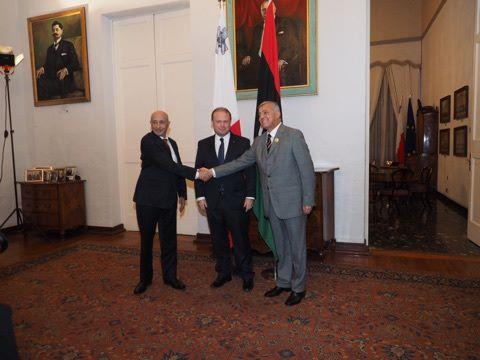Three-and-a-half short months since Prime Minister Joseph Muscat triumphantly posed with two rival Libyan leaders as they shook hands at Castile and declared Malta as a regional peace-broker, those same two individuals have been slapped with sanctions by the European Union and are being accused of hindering the new UN-brokered Libyan government from beginning work.
On Friday, the European Union sanctioned Agilah Saleh, parliament head in the eastern city of Tobruk, and Nuri Abu Sahmain, who leads the outdated General National Congress, as well as Khalifa Ghweil, head of the so-called National Salvation Government.
All three have been hit with travel bans and asset freezes for “obstructing the implementation” of last December’s Libyan political agreement and the formation of the so-called Government of National Accord.
According to an EU official speaking with the AFP, all three of them have assets in Malta that will have to be frozen in line with the EU sanctions.

The EU added that it “remains concerned about the situation in Libya, and in particular about acts that threaten the peace, security or stability of the country, and that impede or undermine the successful completion of Libya’s political transition.”
Back on 15 December 2015 in Malta, Agilah Saleh and Nuri Abu Sahmain said that the UN-brokered – and EU supported – deal was not in the best interests of the Libyan people and that it would not be signed.
Instead, the two Libyan sides agreed to start forming committees as from the next day to work on all the positive points that had emerged during the dialogue, eventually leading to the formation of a national unity government.
The meeting, hosted by Malta, had raised eyebrows in EU circles and there were many who questioned why Malta was hosting such a meeting just a day before they were to sign a peace accord and form a national unity government proposed by the UN.
Agilah Saleh had said that the outcome of the dialogue meeting was a positive one which showed that when Libyan leaders meet, problems will be solved.
“We would like to form a national unity government but do not want it to be forced upon us from outside. For this government to be formed, it must be agreed upon by all the people,” he said, while extending his gratitude to the Maltese government.
That clearly has not happened and UN-brokered talks to get a unity government up and running have been bogged down. Libya has been split between rival governments since 2014, a consequence of the chaos that engulfed the country after a 2011 uprising that toppled and killed long-time dictator Moammar Gaddafi.
One is an Islamist-backed government in Tripoli, the other an internationally recognised leadership based in the east. Amid a power struggle and a security vacuum, the Islamic State group has gained a foothold in Libya. It has taken over the central city of Sirte and has carried out deadly attacks across the country.
The hope of the international community is that an operational unity government could eventually seek military help against the extremists. The EU also wants a stable government to help stop the flow of migrants into Europe.